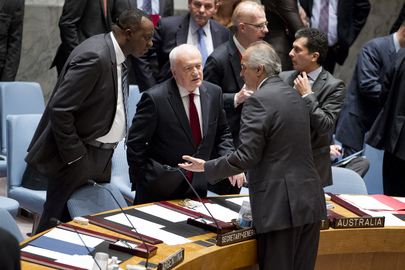By Julia Airey
Staff Writer
Recent diplomatic actions in the 68th session of the UN General Assembly by Zimbabwe’s President, Robert Mugabe, has caused the much-discussed debate about representation in the Security Council to resurface. President Mugabe argued that the UN does its members an injustice by allowing Europe two of the five seats on the Security Council, while Africa is afforded none. The South African President has echoed this sentiment, stating that surely one of the 54 African countries deserve a permanent seat on the Security Council.
Africa, however, is not the only continent without a representative on the Security Council. Latin America is also not represented among the permanent five Council members – an issue that has been raised by representatives of Brazil, Argentina, and Mexico.
The problem facing the continents wishing for representation is that membership is tied to the United Nations Charter. The UN Charter, which stipulates Security Council membership, is largely the brainchild of the victors of the Second World War. Not incidentally, the victors were named as the five permanent members of the Security Council. In order to allow for other members, the five permanent members would have to agree to change the UN Charter, and the Generaly Assembly would also have to approve all changes by a 2/3 vote.
The Security Council is also made up of ten non-permanent members who are a part of the General Assembly. Members of the General Assembly rotate out, and are rotated in by election from the 192 member states of the UN every two years. The current non-permanent members are Guatemala, Argentina, Australia, Luxembourg, Azerbaijan, Morocco, Pakistan, Togo, Rwanda, and South Korea.
The ten membership slots of the General Assembly are allocated into geographical “blocks”, such as the African and Latin American blocks. Although this structure aims to promote equal representation, many have pointed out that ultimately only permanent Security Council membership will allow for this. This point is especially crucial given that member states of the General Assembly cannot be voted into the Security Council on a consecutive basis, and therefore go years without representation. This can be especially frustrating for African member states, for almost 70% of the cases passing through the Security Council concern the affairs of African member states.
Yet the criticism the General Assembly receives for inaction is not fully warranted. There have been numerous attempts at reform since the 1990’s. The G4 nations (Brazil, Germany, India, and Japan) and several member states have created the organization Uniting for Consensus to protest their lack of representation.
In 2004, then UN-Secretary General Kofi Annan enlisted an advisory team to draft a membership reform recommendation, however, the proposals ultimately failed because of the permanent member’s inability to agree on which states would gain membership. To complicate matters further, the exact reform structure also could not be agreed upon.
Should the Council expand the number of permanent member states to ten? Should the number remain the same, but the member states simply change? There will be another effort to reach consensus soon, led by Atul Khare; Secretary General Ban Ki-moon appointed him in 2011. Despite this new jab at reform, non-permanent members are not optimistic. Yet, with the Security Council nearing its 70th anniversary and the conflict in Syria raging on, the kairos (moment) for membership reform has never seemed so appropriate. Change seems to be inevitable; it is just a matter of when and how.
Julia Airey, class of 2015, is a Law and Linguistics major from Ashby, Massachusetts, United States.

